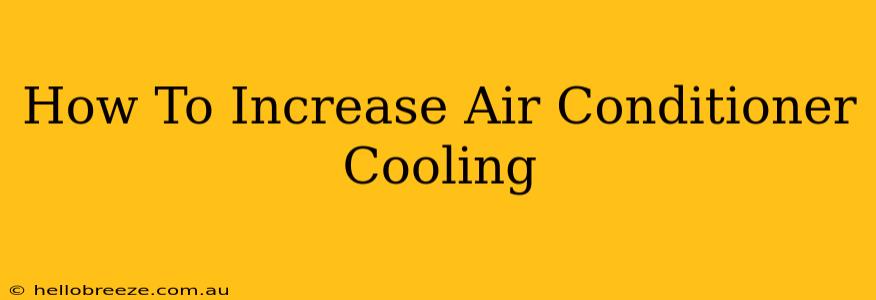Is your air conditioner struggling to keep up with the summer heat? Feeling that your AC just isn't cutting it, even on the highest setting? Don't despair! There are several things you can do to significantly improve your air conditioner's cooling power and keep your home comfortably cool. This guide will provide practical tips and tricks to boost your AC's performance without breaking the bank.
Simple Ways to Maximize Your Air Conditioner's Cooling Power
Before calling in a repairman, try these simple steps. Often, a little maintenance can make a big difference in your AC's efficiency:
1. Change or Clean Your Air Filter
This is the single most important thing you can do. A clogged air filter restricts airflow, forcing your AC to work harder and potentially reducing its cooling capacity. Change your filter every 1-3 months, or more frequently if you have pets or allergies. A clean filter ensures proper airflow and optimal cooling.
2. Clean Your AC Unit's Coils (Exterior Unit)
The coils on your outdoor unit are crucial for heat dissipation. Over time, they can become clogged with dirt, dust, leaves, and other debris, reducing efficiency. Use a garden hose to gently rinse the coils, removing any buildup. Be careful not to damage the fins. If you're uncomfortable doing this yourself, a professional cleaning is a worthwhile investment.
3. Ensure Proper Ventilation
Make sure there's adequate space around your outdoor unit. Clear away any obstructions like plants, furniture, or debris that might be blocking airflow. Good ventilation is essential for proper heat exchange. Also, check your indoor vents – make sure they aren't blocked by furniture or curtains.
4. Seal Air Leaks
Air leaks can significantly reduce the effectiveness of your AC. Warm air entering your home through cracks and gaps will force your system to work overtime. Caulk and weatherstrip windows and doors to prevent drafts and improve your home's overall energy efficiency.
5. Use Window Coverings
Sunlight heating up your home will put extra strain on your AC. Close blinds, curtains, or shades during the hottest parts of the day to block out direct sunlight. This can substantially reduce the load on your cooling system. Consider using reflective window films for even better results.
6. Adjust Your Thermostat Settings
While it might seem obvious, many people don't optimize their thermostat settings. Setting your thermostat a few degrees higher when you're away or asleep can save energy and extend the life of your AC unit. Consider using a programmable thermostat for automated temperature control.
7. Maintain Proper Humidity Levels
High humidity makes it harder for your AC to cool your home effectively. Using a dehumidifier can help to improve the cooling efficiency of your air conditioning system, especially in humid climates.
When to Call a Professional
If you've tried all these steps and your air conditioner is still underperforming, it's time to call in a qualified HVAC technician. They can diagnose any underlying issues, such as:
- Refrigerant leaks: Low refrigerant levels significantly reduce cooling capacity.
- Compressor problems: The compressor is the heart of your AC, and malfunctions can severely impact performance.
- Electrical issues: Problems with wiring or other electrical components can prevent the AC from working correctly.
- Dirty condenser coil: While you can clean some debris, a professional can handle more stubborn build up.
By following these tips and addressing potential issues promptly, you can keep your home cool and comfortable throughout the summer months. Remember, regular maintenance is key to extending the lifespan and improving the efficiency of your air conditioner.

